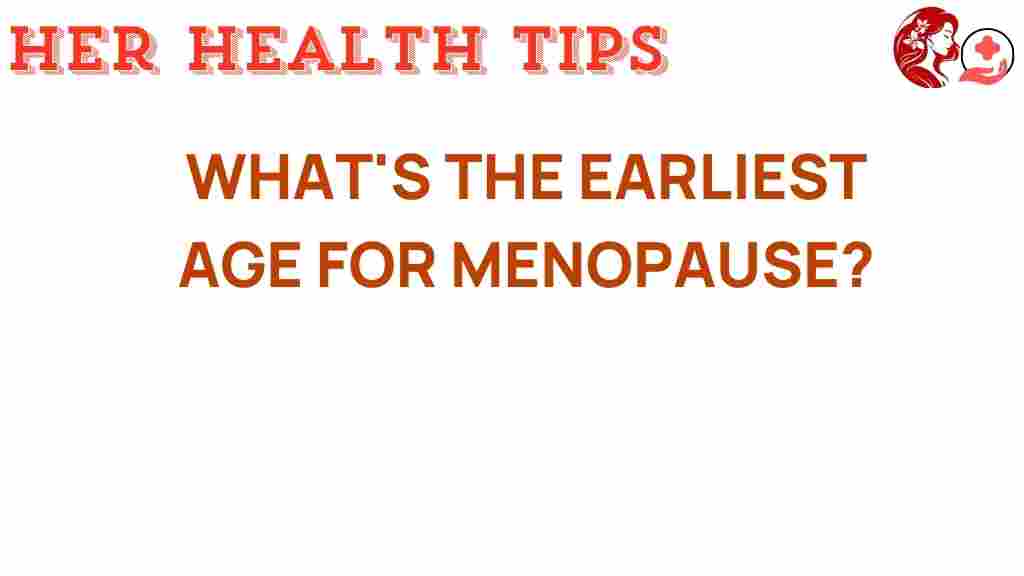Unraveling the Mystery: What’s the Earliest Age for Menopause?
Menopause is a significant milestone in a woman’s life, marking the end of her reproductive years. For many, this transition is accompanied by various symptoms, and understanding the earliest age for menopause is crucial for women’s health. In this article, we will explore early menopause, its symptoms, age factors, and the hormonal changes associated with this natural process. Our goal is to raise menopause awareness and provide valuable insights into reproductive health.
Understanding Menopause
Menopause is defined as the time in a woman’s life when her menstrual periods cease, typically occurring between the ages of 45 and 55. However, some women may experience early menopause, which can occur before age 45. This premature transition can bring about various physical and emotional symptoms that can significantly impact a woman’s quality of life.
What is Early Menopause?
Early menopause, also known as premature ovarian insufficiency (POI), is when a woman experiences menopause before the age of 40. This condition affects approximately 1% of women and is often associated with hormonal changes that lead to the cessation of ovulation and menstruation.
The Importance of Age Factors
Age factors play a critical role in determining when a woman will go through menopause. Various elements can influence the timing of this transition, including:
- Genetics: A family history of early menopause may increase the likelihood of experiencing it yourself.
- Medical Conditions: Certain health issues, such as autoimmune diseases or thyroid disorders, can lead to early menopause.
- Lifestyle Choices: Smoking, excessive alcohol consumption, and poor diet can also contribute to hormonal changes that affect menopause timing.
Symptoms of Menopause
The transition into menopause, especially early menopause, can present a range of symptoms that vary from woman to woman. Common symptoms include:
- Hot Flashes: Sudden feelings of warmth, often accompanied by sweating and flushing.
- Nights Sweats: Intense sweating during sleep that can disrupt rest.
- Irregular Periods: Changes in menstrual cycle frequency and flow.
- Mood Swings: Emotional fluctuations that can lead to irritability or anxiety.
- Sleep Disturbances: Insomnia or difficulty sleeping through the night.
- Vaginal Dryness: Discomfort due to decreased estrogen levels affecting vaginal tissues.
Recognizing these symptoms is essential for women’s health, as they can help in identifying the onset of menopause and seeking appropriate treatment options.
Step-by-Step Process of Menopause
Understanding the process of menopause can empower women to take charge of their reproductive health. Here’s a breakdown of the menopause process:
1. Perimenopause
This transitional phase can last several years, often starting in a woman’s 30s or 40s. During this time, hormonal changes begin, leading to irregular periods and the onset of early menopause symptoms.
2. Menopause
Menopause is officially diagnosed after 12 consecutive months without a menstrual period. At this stage, estrogen levels decline significantly, resulting in various physical and emotional changes.
3. Postmenopause
Postmenopause refers to the years following menopause. While some symptoms may ease, others, such as vaginal dryness or osteoporosis, may persist or develop, necessitating ongoing care and lifestyle adjustments.
Hormonal Changes During Menopause
The hormonal changes during menopause are pivotal in understanding its impact on women’s health. Key hormones affected include:
- Estrogen: Levels drop significantly, leading to various menopause symptoms.
- Progesterone: Fluctuations in this hormone can cause irregular menstruation.
- Testosterone: Although primarily associated with men, women also produce testosterone, and its decline can affect libido and energy levels.
These hormonal changes can drastically alter a woman’s physical and emotional well-being, making it vital to stay informed and proactive about reproductive health.
Troubleshooting Tips for Managing Menopause Symptoms
Managing menopause symptoms, especially in the case of early menopause, can be challenging. Here are some practical tips to navigate this transition:
1. Lifestyle Modifications
- Healthy Diet: Emphasize fruits, vegetables, whole grains, and lean proteins to support overall health.
- Regular Exercise: Engage in physical activity to help reduce symptoms and improve mood.
- Avoid Triggers: Identify and minimize exposure to hot flash triggers, such as spicy foods, caffeine, and alcohol.
2. Hormone Therapy
Hormone replacement therapy (HRT) can help alleviate severe symptoms by restoring hormonal balance. Consult a healthcare provider to discuss the potential benefits and risks.
3. Alternative Treatments
- Herbal Remedies: Some women find relief with herbal supplements, such as black cohosh or evening primrose oil. Always consult with a healthcare professional before starting any new treatment.
- Mind-Body Practices: Techniques like yoga, meditation, and acupuncture may help manage stress and reduce symptoms.
4. Seek Support
Connecting with other women going through similar experiences can provide emotional support and practical advice. Consider joining a support group or seeking counseling if needed.
Conclusion
Understanding the earliest age for menopause and the associated symptoms is crucial for women’s health. Early menopause can bring unique challenges, but with awareness and proactive management, women can navigate this transition more comfortably. Remember, each woman’s experience is different, and seeking appropriate care is essential for maintaining reproductive health.
For more information on menopause and its impact on women’s health, explore this comprehensive resource. Stay informed, stay empowered, and embrace this natural phase of life.
This article is in the category Reproductive and created by HerHealthTips Team
